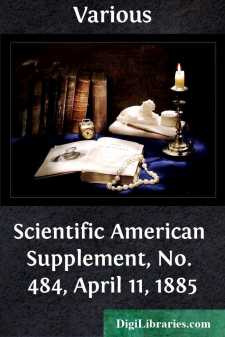Categories
- Antiques & Collectibles 13
- Architecture 36
- Art 48
- Bibles 22
- Biography & Autobiography 813
- Body, Mind & Spirit 142
- Business & Economics 28
- Children's Books 14
- Children's Fiction 11
- Computers 4
- Cooking 94
- Crafts & Hobbies 4
- Drama 346
- Education 46
- Family & Relationships 57
- Fiction 11828
- Games 19
- Gardening 17
- Health & Fitness 34
- History 1377
- House & Home 1
- Humor 147
- Juvenile Fiction 1873
- Juvenile Nonfiction 202
- Language Arts & Disciplines 88
- Law 16
- Literary Collections 686
- Literary Criticism 179
- Mathematics 13
- Medical 41
- Music 40
- Nature 179
- Non-Classifiable 1768
- Performing Arts 7
- Periodicals 1453
- Philosophy 64
- Photography 2
- Poetry 896
- Political Science 203
- Psychology 42
- Reference 154
- Religion 513
- Science 126
- Self-Help 84
- Social Science 81
- Sports & Recreation 34
- Study Aids 3
- Technology & Engineering 59
- Transportation 23
- Travel 463
- True Crime 29
Punch, or the London Charivari, Vol. 147, October 14, 1914
by: Various
Categories:
Description:
Excerpt
October 14, 1914.
Strong drinks have now been prohibited all over Russia, and it looks as if Germany is not the only country whose future lies on the water.
Rumour has it that Germany is not too pleased with Austria's achievements in the War, and there has been in consequence not a little Potsdam-and-Perlmuttering between the two.
"When the Kaiser goes to places beyond the railway," we are told, "he travels in a motor-car which, besides being accompanied by aides-de-camp and bodyguards, is also watched by special secret field police." We are glad to learn that every precaution is taken to prevent his escape.
The Kaiser once desired to be known as "The Peace King." His eldest son, to judge by his alleged burglarious exploits, now wishes to be known as the Charles Peace Prince.
It is said that Major von Manteuffel, who superintended the destruction of Louvain, has been recalled. We presume he will have to explain why he left the Town Hall standing.
We still have to go to Germany for news about our own country. The latest reliable report is to the effect that there is now serious friction between King George and Lord Kitchener, the former having become alarmed at the raising of "Kitchener's Army." The War Minister, the King fears, is aiming at the throne, and it is now being recalled that Lord Kitchener, when a young man, was once told by a soothsayer, "K stands for King."
We learn from The Daily Call that, in proportion to the number of its inhabitants, Bâle is the richest city in Europe. The Swiss, we fancy, will scarcely thank our contemporary for drawing attention to this fact in view of the well-known cupidity of a certain neighbour of theirs.
There is a proposal on foot to form a corps of Solicitors. By a pretty legal touch it is suggested that they might train between six and eight.
The Daily News the other day, in describing the fortunate escape of a midshipman from the Cressy, told its readers that, when pulled out of the water, the cadet "was not wearing a single garment. He was provided with clothes and eventually put on a British destroyer." While his choice of covering does credit to the young gentleman's spirit, we think he would have done better to put on the clothes.
A naturalisation certificate has been granted to that clever English authoress, the Countess Arnim. We congratulate Elizabeth on escaping from "her German Garden."
"Few people," says The Witney Gazette, "are familiar with the history and resources of Belgium." How true this is may be seen from our contemporary's next statement:—"A large section of its population consists of a race known as the Walloons, the ancient descendants of the Belgians."
"Father," asked the actor's little son, "why does the Kaiser wear a helmet with an eagle on the top of it?" "To show that he's 'got the bird,'" replied the brilliant Thespian.
By the way, the statement that "The Tsar has left for the theatre of war" has caused the keenest satisfaction in histrionic circles, where it is hoped that this illustrious example will cause the fashionable world to revert to its habit of patronising the stage.
...











